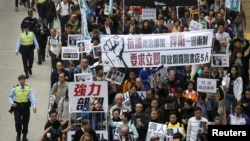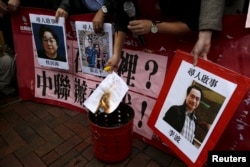Two of the five people missing from Hong Kong's Causeway Bay Books store returned to the city over the past several days, but police said they were refusing to cooperate with investigators.
All five booksellers, including owner Gui Minghai, were thought to have been abducted and taken to Beijing for selling literature banned in mainland China.
Cheung Chi-ping asked Hong Kong police to cancel his missing-person case two days after his fellow bookseller, Lui Por, returned to Hong Kong and made the same request.
Both men requested no further help from the government or police and "refused to disclose other details," police said.
A third bookseller, Lam Wing-kee, is expected to return to Hong Kong shortly. In February, all three appeared on pro-Beijing TV to confess their wrongdoings, explaining that they had been detained for illegal book trading in mainland China.
Pro-Beijing Phoenix TV reported that Gui was found selling a large number of political books banned in mainland China through online channels, "conducting illegal business for illegal benefits."
The report said Gui admitted his guilt and that the three others confessed to "acting with Gui's orders."
The fifth bookseller, Lee Bo, who appeared in a separate Phoenix TV interview February 29, said that he voluntarily went to the mainland to assist in a Chinese investigation that required him to furnish evidence against people whom he declined to name.
Lee, who is a dual British-Hong Kong citizen, also said he planned to renounce his British citizenship.
Links to publisher
Lee went missing December 30 last year, months after his publishing associates disappeared. The men were all associated with publisher Mighty Current, which specializes in books on political scandals involving China's communist leaders and other sensitive topics that are banned in mainland China.
The disappearances also drew concern that China was eroding the "one country, two systems" principle under which Hong Kong has been governed with civil liberties such as freedom of the press.
"In fact, this case is a political event, concerning a publisher and a writer engaged in political writing and political books publishing," said Bei Ling, a poet and longtime friend of Gui. "I would call it the most serious political event since 1997, when Hong Kong returned to Chinese rule.
"If someone violates the law in Hong Kong, they should be sanctioned by the law in Hong Kong," he added. "How can they be abducted from Hong Kong and Thailand to mainland China for law enforcement?" Gui was believed by diplomats familiar with the case to have been abducted or coerced from Thailand.
Bei said that all five involved in the case spoke of their "crimes" under tight control of the Chinese police, which indicates, he said, that Chinese authorities are determined to reveal only their version of events, regardless of fact.
This report was produced in collaboration with VOA's Mandarin service.





